
“I’m Also Taking Him Shopping”: Wife Stands Up To Her Husband Who Refuses To Support His Trans Son
Interview With ExpertNot everybody agrees with the gender they were born in, and to beat the many challenges that await these people, friends’ and family’s support is crucial.
But as this woman shared, sometimes, even the closest people turn their backs on you. For example, when her stepson came out as transgender, her husband put on a “it’s just a phase” mentality, ignoring the fact he had just learned. And when the stepmother took the teen to get a haircut, the man got furious. Scroll down below and read the full story!
More info: Reddit
Gender, which is assigned at birth, does not always match with what a person feels they are, but sometimes, even the people close to them find it hard to comprehend that
Image credits: cottonbro studio (not the actual photo)
A trans boy came out to his parents, and while his stepmom was very supportive, his father pretended he didn’t hear it
The kid wanted to get his hair buzzed, but his bio mom, afraid of messing up her case for the child’s custody, couldn’t do it, so his stepmom took him to a barbershop instead
Image credit: u/Resident-Step-2917
When the father found out, he was furious, and the woman’s family said she crossed the line
The story takes place a couple of years ago. OP’s stepson, who at the time was 13 years old, came out to her and his dad as transgender. But while the stepmom offered him unconditional support, his father never accepted this.
The man refused to hear anything his wife said regarding this subject and kept rejecting his son’s recent changes. Since the father had full custody, and his mom was afraid that going behind her ex’s back would hurt her chances of changing that, the teen couldn’t even get the haircut he wanted.
Having no one else to ask this from, the stepson came to his stepmother for help who took him to a barbershop. This made the kid extremely happy. The same, however, couldn’t have been said for his father, as the man got furious, and many people from OP’s own family agreed that she crossed the line.
People in the comment section unanimously voted that the woman was NTA, praising her for supporting the child and bashing her husband for his negligence. In one of the replies, she also updated the readers, saying that she started documenting everything the boy’s father does and she will use that to help her stepson’s bio mom in the fight for the child’s custody.
Image credits: Ariel Paredes (not the actual photo)
The boy’s father is undeniably wrong for being dismissive of his son’s feelings and proclaiming that it’s “just a phase.” But, as we learned from The New York Times, there is a small percentage of transgender kids who revert to the gender they were assigned at birth.
The article cites data from the Trans Youth Project, which followed 317 children aged 3 to 12 in the USA and Canada who underwent the transition on average at age 6.5. While 5 years later, the majority of participants still identified with the gender they chose and even began initiating their biological changes, the study discovered that 2.5 percent of the group decided to turn back.
The Trans Youth Project began the recruitment process in 2013 by traveling around the USA and Canada and performing in-depth interviews with the participants’ families, which is very thorough for this type of research that usually limits the data collection to surveys and information collected from specific clinics.
Because the study was started around a decade ago and many more children identify as trans or non-binary now, it’s unclear if the results of this research reflect the current situation accurately. In addition to that, two-thirds of the participants were Caucasian and came from higher education and income families with at least fairly supportive parents.
But at the same time, the project’s previously published work showed that children who their families backed during the transitioning period had no different levels of depression and only slightly higher levels of anxiety than non-transgender kids, which only emphasizes the impact and importance of support from the people they’re close to.
Image credits: Alex Green (not the actual photo)
To get a better understanding of what trans youth deal with and how we can better help them in their journey, Bored Panda reached out to Laura Scarrone Bonhomme, who is a Clinical Psychologist specializing in gender, sexual, and relationship diversity.
Before focusing on the world of gender, Laura worked with various communities plagued by stigmas. However, it was not only the challenge that drew her in but also the possibility of helping those so often misunderstood and misrepresented, and the sense of fulfillment that comes with that.
“In the realm of gender, I find an ever-evolving landscape — from medicine to politics, sociology to history; gender expands to every field. This ensures that I’m perpetually learning (and, thankfully, never bored!). Working with the queer communities continually challenges my cishet perspectives, pushing me to re-evaluate and grow,” says the expert, at the same time describing trans people as wonderful, earnest, seeking acceptance and the right to be themselves.
Laura Scarrone is also the co-founder and director of Affirm, which is one of her proudest projects. It’s “an online training company dedicated to supporting a greater understanding of the issues faced by trans and non-binary people,” says the psychologist, adding that anyone seeking more information is absolutely welcome to visit their website or LinkedIn and Instagram profiles.
According to Laura, at the top of the list of the difficulties that transgender youth encounter the most is a struggle with coming out to their families because of possible rejection, abuse, or even homelessness. “Living a double life, with different clothes and names in different settings, can lead to significant psychological stress,” she says, emphasizing that this can lead to horrible consequences.
The psychologist adds that bullying and transphobic attacks are also not unheard of and cites a 2018 study by the American Academy of Pediatrics, which found that over 50 percent of trans male teens have reportedly attempted suicide. “The onset of puberty can exacerbate gender dysphoria, potentially leading to low mood, social anxiety, eating disorders, or self-harm. And neurodiversity often coincides with gender diversity, adding layers of social communication challenges.”
Finalizing her answer, the expert underlines the importance of gender-affirming care, saying that those who can’t get it can be left feeling helpless with their bodies developing in an opposite way of their gender identity.
Image credits: Mercedes Mehling (not the actual photo)
With one of the greatest trans people’s fears being rejection by their families, it’s essential to know what to do when such a scenario actually happens. In such cases, Laura Scarrone says finding a community is crucial. “For many, this might mean socially transitioning at school or a social club while remaining in their birth-assigned gender at home.”
The specialist suggests trans people seek support from their school counselors or join queer support groups where they can connect with others who know what it’s like to be in their shoes. “Safe spaces, even online ones where they can use their chosen name or even a gender-congruent avatar, are vital.”
“Additionally, it’s important for them to understand that there is no ‘right’ or ‘wrong’ way to be transgender. They should be wary of narratives that propagate self-hatred, which can be subtly transphobic or overly medicalized,” adds the psychologist, saying that transgender people should embrace their identity and authenticity instead of trying to fit external standards or models. “The idea that being trans requires self-loathing is a harmful misconception.”
In conclusion, the psychologist tells us that providing help and supporting trans youth starts with understanding and respect. “Recognize that young people often have a clear sense of their identity and needs.”
Laura says that while politics or things like what actually defines a specific gender are discussed often, the needs and the small things that make that person feel good are not as much, yet they’re no less important. It’s nice to focus on something like their freedom in self-expressive clothes or simply calling them by an affirming name that they prefer.
The specialist urges people to educate themselves with scientifically informed sources. “And remember, empathy doesn’t require complete understanding, just a willingness to be there and support them.”
Ultimately, we’re all very different, and we all seek ways to define who we are. Whether through the things we speak and do, the clothes we wear, the names we go by, or the gender we identify with, there are many ways to do that, and none of them is more right than the others.
With some of these things sadly being less socially acceptable, supporting people on a more difficult path of self-realization is crucial, especially when they’re your own family. Because in the end, the most important thing in life is happiness, and sometimes we forget that we hold a great deal of influence over it for other people.
Redditors praised the woman for supporting the kid and didn’t hold back on saying what they thought about his father
Exactly! When my nephew came out, he said he was experimenting. Since names and pronouns are easy reverse, I went along with it right away. It was NOT a phase and I'm very happy for him finding himself. The first two days, I felt a little sad (and guilty) because I was saying farewell to his former self. Bless the mom of a trans teen who told me it was normal. I sure as hell didn't let those feelings over-ride my manners. My two days were nothing compared to his long struggle before coming out.
Load More Replies...Interesting choice of words for the dad, “It’s just a phase.” If you truly believe that, then just chill out and let them explore that side of who they are. If it’s a phase, the result is your kid feeling supported. And if it isn’t a phase, then hey look at that the kid still feels supported!! See how that works. Someone said that they would rather their kid change gender preferences a bunch of times, then to have to write their obituary.
EXACTLY. One of the girls I used to babysit changed her nickname practically every other week. Her parents could've dug in and insisted on calling her by her given name, but they were both teachers, so they just rolled with it. Whenever I came over, I'd double check with her mom on what to call her. She eventually outgrew it and picked a name to stick with.
Load More Replies...Even if it were "just a phase", so what? This guy has a lonely old age ahead.
When my daughter was 13, she thought she might be gay. I said okay. She then thought she was trans. I said okay. I respected his pronouns and said it didn't matter to me one way or the other, as long as they didn't make their whole existence about that... that gender and sexuality should be the least interesting thing about them. Eventually realized that the only attraction was to boys and is a teenage girl that just went through her first breakup. People ask how I feel about her changing identity and I said she just needed to figure out who she was... my job is to love and support her. I would rather she figured out who she was than for her to have to be terrified of who they might be.
You are an awesome parent. Kids that age go through a lot of figuring out who they are. Maybe it has to do with gender identity, maybe it has to do with being goth or preppy or into punk rock. The best thing a parent can do is just support them. Being 13 is hard enough without your parents making it harder.
Load More Replies...She indeed crossed a line. But sometimes crossing a line is the best thing to do.
This goes with a previous Bored Panda post that says "My Adult Children Don't Talk To Me Any More." Stuff like this is WHY. Good for you, OP, supporting your stepson. Hope his mom can get custody since his dad is... not accepting the truth.
Exactly! When my nephew came out, he said he was experimenting. Since names and pronouns are easy reverse, I went along with it right away. It was NOT a phase and I'm very happy for him finding himself. The first two days, I felt a little sad (and guilty) because I was saying farewell to his former self. Bless the mom of a trans teen who told me it was normal. I sure as hell didn't let those feelings over-ride my manners. My two days were nothing compared to his long struggle before coming out.
Load More Replies...Interesting choice of words for the dad, “It’s just a phase.” If you truly believe that, then just chill out and let them explore that side of who they are. If it’s a phase, the result is your kid feeling supported. And if it isn’t a phase, then hey look at that the kid still feels supported!! See how that works. Someone said that they would rather their kid change gender preferences a bunch of times, then to have to write their obituary.
EXACTLY. One of the girls I used to babysit changed her nickname practically every other week. Her parents could've dug in and insisted on calling her by her given name, but they were both teachers, so they just rolled with it. Whenever I came over, I'd double check with her mom on what to call her. She eventually outgrew it and picked a name to stick with.
Load More Replies...Even if it were "just a phase", so what? This guy has a lonely old age ahead.
When my daughter was 13, she thought she might be gay. I said okay. She then thought she was trans. I said okay. I respected his pronouns and said it didn't matter to me one way or the other, as long as they didn't make their whole existence about that... that gender and sexuality should be the least interesting thing about them. Eventually realized that the only attraction was to boys and is a teenage girl that just went through her first breakup. People ask how I feel about her changing identity and I said she just needed to figure out who she was... my job is to love and support her. I would rather she figured out who she was than for her to have to be terrified of who they might be.
You are an awesome parent. Kids that age go through a lot of figuring out who they are. Maybe it has to do with gender identity, maybe it has to do with being goth or preppy or into punk rock. The best thing a parent can do is just support them. Being 13 is hard enough without your parents making it harder.
Load More Replies...She indeed crossed a line. But sometimes crossing a line is the best thing to do.
This goes with a previous Bored Panda post that says "My Adult Children Don't Talk To Me Any More." Stuff like this is WHY. Good for you, OP, supporting your stepson. Hope his mom can get custody since his dad is... not accepting the truth.

 Dark Mode
Dark Mode 

 No fees, cancel anytime
No fees, cancel anytime 







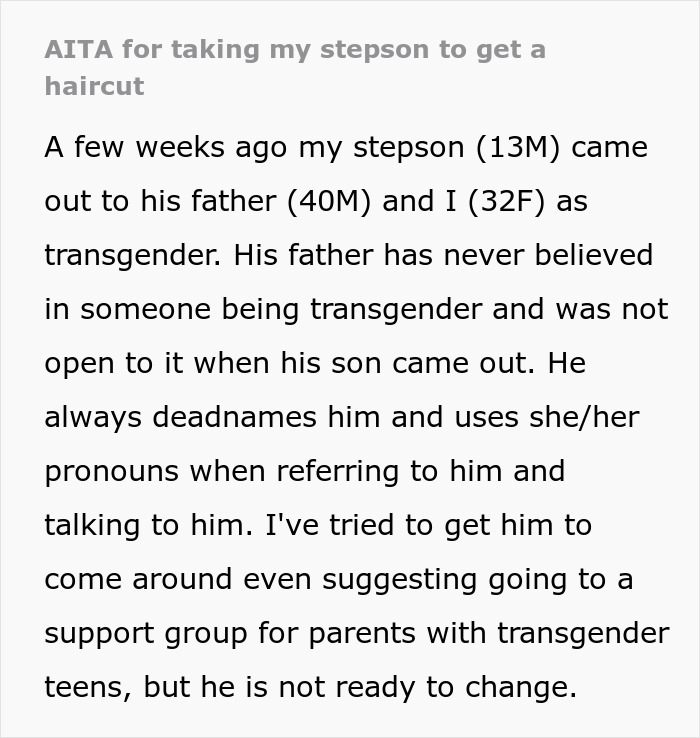

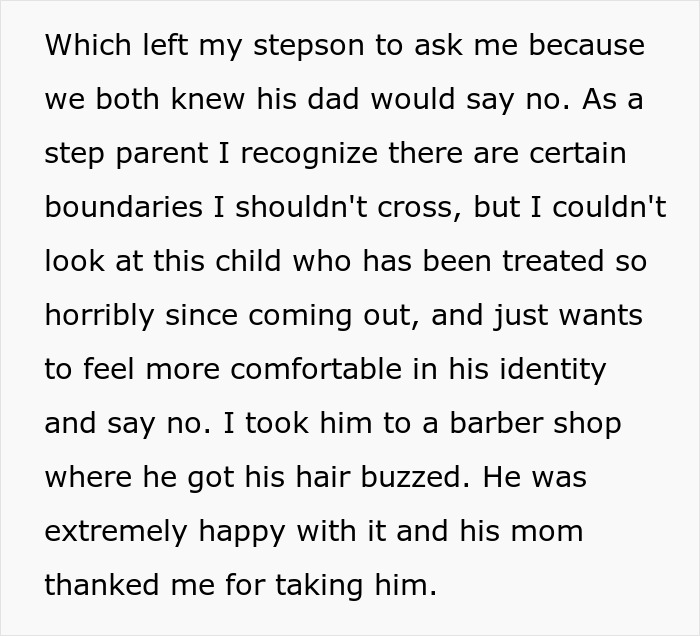





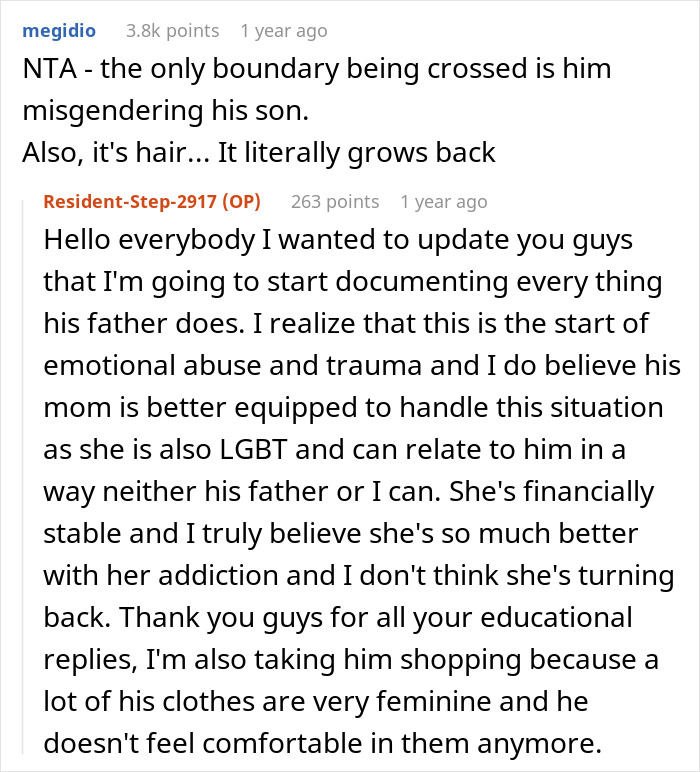

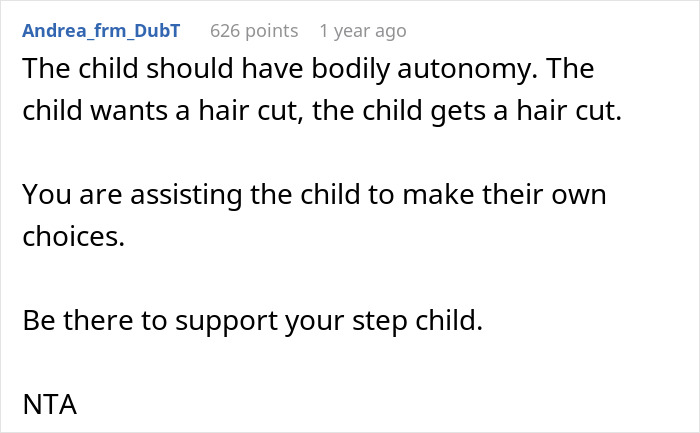

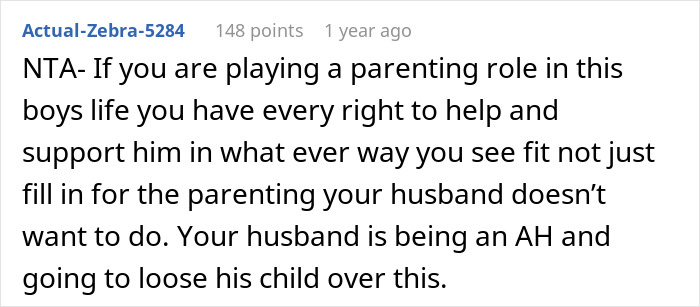

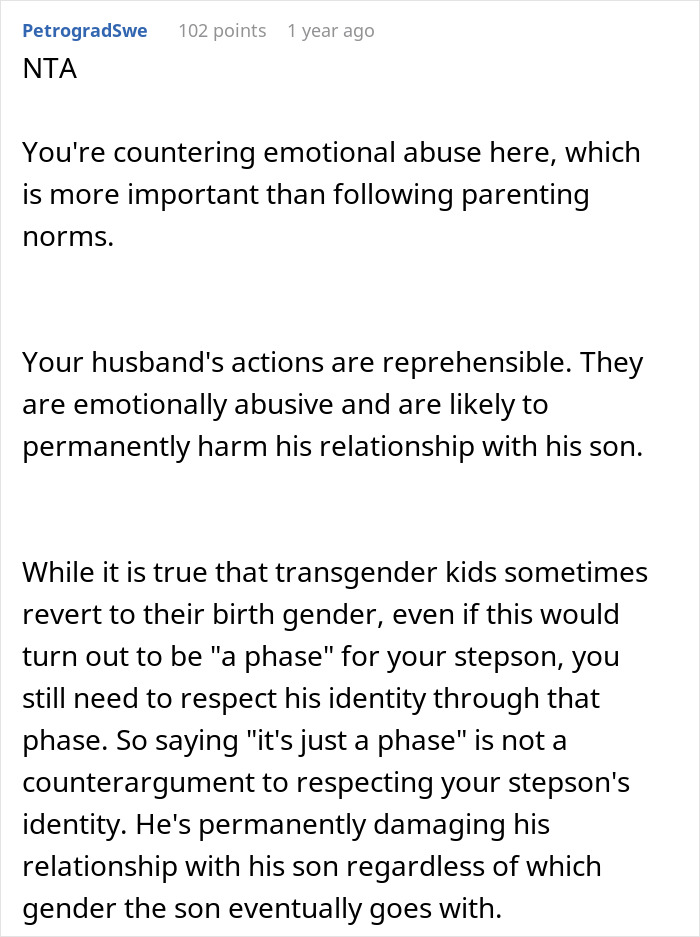

















































63
58